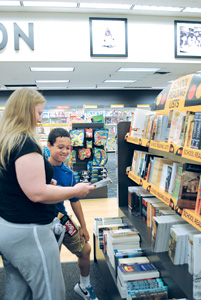Editorial
Front Page - Friday, July 9, 2010
Summer reading aims to build literacy for bright futures
Erica Tuggle
 Ginger Gustafson and her son, Jermel Hunter, browse the summer reading section of the Hixson Books-A-Million. Hunter, a second grader at Hardy Elementary, is reading on the sixth grade level, Gustafson says. She attributes his ability to being exposed to reading during the first five years of his life, which she calls, “the formative age.”
- Erica Tuggle
Ginger Gustafson and her son, Jermel Hunter, browse the summer reading section of the Hixson Books-A-Million. Hunter, a second grader at Hardy Elementary, is reading on the sixth grade level, Gustafson says. She attributes his ability to being exposed to reading during the first five years of his life, which she calls, “the formative age.”
- Erica Tuggle
The clock is running out for students to finish up their summer reading before school resumes, and the dread of summer reading for some is evident as students skip reading the synopsis and instead focus on the page count of each title option, says Alex Fordney, assistant manager of the Hixson Books-A-Million.
Elizabeth Zachary Snider, the director of secondary literacy for the Hamilton County Department of Education, says, as a district, they are encouraging “punishment-free” summer reading in an effort to get students to read for enjoyment.
Different schools have different methods of getting kids hooked on books. Tyner Academy is reading one title as a school, encouraging parents to read with their students and plan for a school-wide discussion. Dalewood Middle took the jump-start approach by using the end of the last school year to help students start on their books.
Normal Park is being democratic about the process in offering a selection of books named as favorites of students moving to the next grade. She says on many campuses, individual teachers determine the book list and the assessment for the reading. Some schools default to the district list on the HCDE Web site, which is only a guide for teachers to go by in assigning summer reading. Snider says the district does not dictate which books a school or teacher should assign, and teachers compiled the master list over the years as a guide.
“After all, in this vast, diverse school district, how could one book meet the needs of all kids?” she says.
Fordney says his store begins preparing for the summer reading rush in May by contacting schools and requesting faxes of their lists. He says they print all these lists and keep them in a binder so that they are handy for customers. The store also notes the popular titles from years past and keeps a stock of these on hand as well. Returning favorites this year, he says, are “Whirligig,” “Three Cups of Tea” and “House on Mango Street.”
The issue bookstores face during summer reading time is that sometimes the lists schools send have out-of-print titles. He says, better communication between bookstores and the school board on newly listed titles would be helpful for the future of the program. He also encourages students to come in soon, and not right before school starts, because if the store has to order a title, it takes seven to ten business days for it to arrive.
Why all this trouble to try to get adolescents reading?
“Hamilton County Schools are focusing on reading and writing workshops in the middle grades to be certain that students are reading and writing every day and discovering the rich benefits of acquiring a ‘reading life,’”?Snider says.
And, although there is push-back by some, it seems to be working, she says, as many students across the county are giving the television a break for a couple of hours and getting into a good book.
Hardy Elementary School student Jermel Hunter is a good example of successful literacy efforts at a young age. Hunter is in the second grade and is already reading at a sixth grade level, says his mother, Ginger Gustafason. He benefited from the Dolly Parton’s Imagination Library program that sends new books to children during their first five years, she says.
“We built his reading at an early age and that’s just priceless. It’s also a bonding and relaxing time,” she says. “When he started reading back to me, I was just so tickled.”
She says she has also witnessed the power reading has on allowing her son, and herself, to be more focused in thoughts, a better writer and learning grammar through reading. She encourages parents to get their children reading, especially during their first five or six years.
Students shouldn’t feel slighted that they have schoolwork in summer, because teachers are also using their summer to be trained in a reading workshop session for a full week in July. In this, they are discussing books and keeping reading journals as they focus on hot selling adolescent titles, Snider says.
Snider says, “We believe that teachers and other adults must model themselves as readers to prove how important a skill and a life enhancement reading really is.”
She says adults can support adolescent literacy by sharing their own literacy background, problems, how they over-
came them and encouraging conversation of this type between anyone.
She says, “The purpose of summer reading is plain and simple, to get kids to read in order to avoid a summer lag in reading.? Just like any other skill, the best way to become better at reading is by reading – and read they must.”
|
|